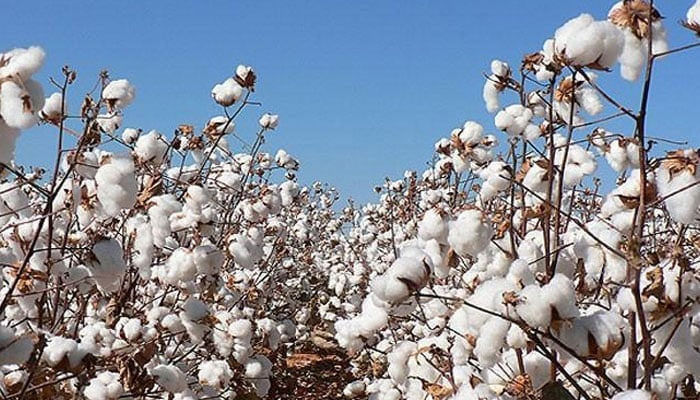PCGA reports dramatic 64pc drop in cotton arrivals, hitting 40-year low
LAHORE: The flow of seed cotton at the ginning stage has decreased to about one-third of last year’s volume, according to arrival data up to September 15, 2024. Total cotton arrivals plummeted to 1.434 million bales in the first half of the current month, compared to 3.933 million bales during the same period last year, marking a massive decline of 64 per cent.
More concerning, arrivals for the last fortnight fell to just 0.208 million bales, down from last year’s corresponding flow of 0.892 million bales, indicating a substantial decrease of 77 per cent.
The Pakistan Cotton Ginners Association (PCGA) data on cotton arrivals includes details on the number of bales pressed and sold, as well as figures for unsold stock. The report also compares the current year’s figures with those of the previous year and provides a regional breakdown of cotton arrivals and their respective percentages.
According to the latest PCGA data, Punjab’s poor performance continues to negatively impact national cotton production. Punjab reported a flow of just 0.538 million bales compared to last year’s arrival of 1.544 million bales, a shortfall of 1.005 million bales or 65.13 per cent. In contrast, Sindh’s districts recorded total cotton arrivals of 0.895 million bales, which is 66 per cent higher than Punjab’s flows up to the ginning stage.
Prospects for exports have dimmed, with only 400 bales sold to exporters or traders. The total unsold stock of cotton stands at 25,516 bales, compared to last year’s volume of 132,128 bales. There have been no sales to the inactive Trading Corporation of Pakistan (TCP), according to the PCGA report.
Six districts report zero cotton arrivals, a historically unprecedented drop in production. Not a single district has shown an increase in cotton arrivals, as per the PCGA report.
Rahim Yar Khan, once a prime cotton-producing district, experienced a staggering 96 per cent decline compared to last year’s flow. Insiders attribute this drop to underreporting by ginners in the district, along with crop damage from adverse weather conditions.
The latest cotton sales data raises concerns among farmers about the volume of the crop, as they face one of the lowest outputs in 40 years. The previous smallest crop was recorded in 2022, devastated by torrential rains and severe flooding. The national production reached its lowest level in recent history during the 1983-84 season, with only 2.9 million bales harvested.
Facing significant losses, farmers are now confronting the possibility of the second-lowest cotton output in the last four decades. Factors contributing to this decline include climate change, low lint prices, poor-quality seeds and high input costs. Given the dismal flow of cotton at the ginning stage, surpassing five million bales this year seems challenging, especially compared to last year’s production of over eight million bales, said a visibly dejected Farooq Bajwa, a farmer from Bahawalpur District.
He said that farmers are grappling with substantial challenges affecting their cotton crop output. Their production has decreased significantly over the years due to various factors, including climate change, lack of quality seeds, high input costs and frequent pest attacks. This decline has prompted many farmers to shift their preferences towards alternative crops like sugarcane and maize instead of cotton.
He urged the government to pay due attention to the struggles faced by cotton growers. Otherwise, he warned, cotton cultivation may no longer be a priority for farmers, seriously impacting the viability of the textile industry.
-
 Royal Family's Approach To Deal With Andrew Finally Revealed
Royal Family's Approach To Deal With Andrew Finally Revealed -
 Super Bowl Weekend Deals Blow To 'Melania' Documentary's Box Office
Super Bowl Weekend Deals Blow To 'Melania' Documentary's Box Office -
 Meghan Markle Shares Glitzy Clips From Fifteen Percent Pledge Gala
Meghan Markle Shares Glitzy Clips From Fifteen Percent Pledge Gala -
 Melissa Jon Hart Explains Rare Reason Behind Not Revisting Old Roles
Melissa Jon Hart Explains Rare Reason Behind Not Revisting Old Roles -
 Meghan Markle Eyeing On ‘Queen’ As Ultimate Goal
Meghan Markle Eyeing On ‘Queen’ As Ultimate Goal -
 Japan Elects Takaichi As First Woman Prime Minister After Sweeping Vote
Japan Elects Takaichi As First Woman Prime Minister After Sweeping Vote -
 Kate Middleton Insists She Would Never Undermine Queen Camilla
Kate Middleton Insists She Would Never Undermine Queen Camilla -
 King Charles 'terrified' Andrew's Scandal Will End His Reign
King Charles 'terrified' Andrew's Scandal Will End His Reign -
 Winter Olympics 2026: Lindsey Vonn’s Olympic Comeback Ends In Devastating Downhill Crash
Winter Olympics 2026: Lindsey Vonn’s Olympic Comeback Ends In Devastating Downhill Crash -
 Adrien Brody Opens Up About His Football Fandom Amid '2026 Super Bowl'
Adrien Brody Opens Up About His Football Fandom Amid '2026 Super Bowl' -
 Barbra Streisand's Obsession With Cloning Revealed
Barbra Streisand's Obsession With Cloning Revealed -
 What Did Olivia Colman Tell Her Husband About Her Gender?
What Did Olivia Colman Tell Her Husband About Her Gender? -
 'We Were Deceived': Noam Chomsky's Wife Regrets Epstein Association
'We Were Deceived': Noam Chomsky's Wife Regrets Epstein Association -
 Patriots' WAGs Slam Cardi B Amid Plans For Super Bowl Party: She Is 'attention-seeker'
Patriots' WAGs Slam Cardi B Amid Plans For Super Bowl Party: She Is 'attention-seeker' -
 Martha Stewart On Surviving Rigorous Times Amid Upcoming Memoir Release
Martha Stewart On Surviving Rigorous Times Amid Upcoming Memoir Release -
 Prince Harry Seen As Crucial To Monarchy’s Future Amid Andrew, Fergie Scandal
Prince Harry Seen As Crucial To Monarchy’s Future Amid Andrew, Fergie Scandal




